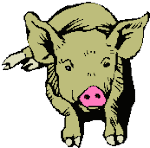When National Geographic photographers get arrested for photographing a feed-lot from the air in Kansas, someone has something they are not keen to advertise!
Anyway, over to Maryn McKenna and her round-up of the latest developments in the gathering storm, including a summary of positions between two of the main protagonists, very senior and influential in Britain, in the BMJ.
As always read the whole to get a fair picture.
We (Animal-Epidemics) continue to hold that MRSA st398 is in British pigs for years and has been wilfully not found by Defra, the British agricultural ministry.
Full McKenna article
here
More on MRSA on Farms and in Farm Workers, and the Arguments For and Against
BY MARYN MCKENNA07.12.138:30 AM
I promised to catch up on some of the other research that has been published on the flow of MRSA (and other resistant organisms) between farm animals and farm workers as a result of farm antibiotic use.
Before I do that, though, I want to nod toward two other great pieces published on this. First, Mark Bittman examined this issue closely at the New York Times. And Clare Leschin-Hoar also covered the new research at Take Part. (Bonus: Don’t miss her dissection of the news that a National Geographic photographer was arrested in Kansas after taking pictures of a feedlot — from the air.)
Next, I promised I’d revisit the paper by Tara Smith and group on antibiotic-resistant bacteria on farms and in farm personnel. This research was published in May, but it has been a long time coming. Now that it is out, it is an important addition to the still-sparse literature on livestock MRSA and the influence of farm antibiotic use on antibiotic resistance...
...As a reminder, Smith and her colleagues were the first to identify livestock MRSA, or MRSA ST398 for short, in pigs and pig-farm workers in the United States, after it had already been identified broadly in the European Union and also in Canada. That first study in 2009 was small and they wanted to do a larger one. Here from their abstract is what they looked for and found:
... Based on genotyping, spa type t034, a common livestock associated variant, was predominant among both human and swine isolates. These results confirm the presence of LA-MRSA in pigs and swine farm workers in the USA, but the prevalence found is relatively low compared with European studies...
... The question has been, how common is MRSA ST398, a strain of drug-resistant staph that can be linked back to farm drug use by its specific resistance signature? ...
... Out of 31 people in the group who carried some strain of MRSA, 21 were carrying the livestock strain...
...As I mentioned, livestock MRSA has a specific genetic signature — resistance to tetracycline — that has been interpreted to be the result of tetracycline use in swine-raising. (Tetracycline resistance is unusual in human MRSA because tetracycline isn’t commonly prescribed for the infection. When it appears, it may be because the gene for tetracycline resistance has traveled into the bacterium as part of a set of genes conferring resistance to several antibiotics at once.) There is an interesting discussion in Smith’s paper of whether on-farm antibiotic use is in fact responsible, or whether other factors are influencing the staph strains; but it is complex enough to leave for another post.
Meanwhile: that antibiotic use on farms causes the emergence ofmantibiotic resistance is supposed to be settled science at this point...
...But a piece in the new BMJ captures that for many people, notably in agriculture and veterinary pharma, the question isn’t settled at all. The colloquy between physician David Wallinga and veterinarian
David G.S. Burch, titled “Does adding routine antibiotics to animal feed pose a serious risk to human health?”, does a great job of capturing how far apart the two sides remain. The colloquy is open
access and I urge you to read it. Quick excerpts that capture the two authors’ points of view:
Wallinga: “Routine antibiotics are not necessary for animal health. Pasture based production was the norm before antibiotics. Industrial style meat production, in which animals are confined in close quarters and fattened on soy and maize based feeds, also is possible without routine antibiotics… Almost every European and North American public health authority agrees: routine antibiotic use in animal food production likely worsens the epidemic of resistance.”
Burch: “Given that the critical antimicrobials in human medicine are not used in animal feed, that regulatory authorities conduct thorough assessments of the risk of resistance from use of antimicrobial substances, and that the environmental effect and the effects of residues in edible tissues are also assessed, it is highly unlikely
that adding antibiotics to feed poses a serious risk to humans, especially compared with the extensive use of antibiotics directly in humans.”
